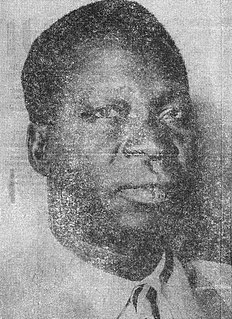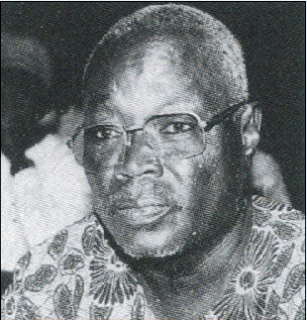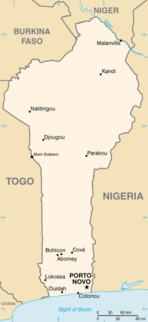
Émile Derlin Zinsou was a Beninese politician and physician who was the President of Dahomey from 17 July 1968 until 10 December 1969, supported by the military regime that took power in 1967. Zinsou was present at the signing of the treaty that formed the African Union on 12 July 2000 in Togo.

Sourou-Migan Marcellin Joseph Apithy was a Beninese political figure most active when his country was known as Dahomey. He arose on a political scene where one's power was dictated by what region in Dahomey one lived in.

Alphonse Amadou Alley was a Beninese army officer and political figure. He was most active when his country was known as Dahomey. He was born in Bassila, central Dahomey, and enrolled in schools in Togo, Cote d'Ivoire, and Senegal before enlisting in the French army in 1950. He saw combat in Indochina from 1950 to 1953, in Morocco from 1955 to 1956, and in Algeria from 1959 to 1961. After the coup in 1965, President Christophe Soglo promoted Alley Chief of Staff of the Army. Young army officer Maurice Kouandété was appointed Alley's chef de cabinet in 1967.

The Ouémé River, also known as the Weme River, is a river in Benin. It rises in the Atakora Mountains, and is about 510 kilometres (320 mi) long. It flows past the towns of Carnotville and Ouémé to a large delta on the Gulf of Guinea near the seaport city of Cotonou. The largest tributaries are the Okpara River and the Alpouro River. Ouémé River is the largest River of Benin Republic. It is located between 6° 30° and 10° north latitude and 0° 52 'and 3° 05' east longitude(Oba S. Alain 2018). It crosses several agro-ecological zones and feeds downstream, the lagoon system ‘'Lake Nokoué-lagoon of Porto-Novo'’ through a Delta zone. The lower Delta of Ouémé, is located between latitude 6° 33'N and 8° 15 'and the meridians 1° 50' and 2° 00 '. The lower Delta of Ouémé begins after municipality of Adjohoun in the department of Ouémé and ends at the south facade where the river flows into the lagoon complex ‘'Nokoué-Porto-Novo'’. The subequatorial climate type, characterized by two rainy seasons and two dry seasons. On the other hand, its hydrological regime depends on the Sudanian climate (north-Benin) with a low water period usually lasts seven months and a flood period. The plant formations along the area are characterized by swamps inhabited by floating plants dominated by water hyacinth, water lily, water lettuce and lemna. There are also undeveloped marshy forests, dominated by the Raphia palm and the oil palm. The part of the valley covered by the water is very productive in fish.
Sénouvo Agbota Zinsou is a Togolese playwright and theatre director.

Iropa Maurice Kouandété was a military officer and politician in Benin. He was born to Somba parents in the Gaba District of Dahomey. Kouandété enrolled in the army in his late teens. Over the years, he became popular among junior soldiers in the north and gained the contempt of those in the south. Jim Hoagland of The Washington Post described Kouandété as a "moody, brilliant and highly ambitious soldier".

Minister of Foreign Affairs of Benin is a government minister in charge of the Ministry of Foreign Affairs of Benin, responsible for conducting foreign relations of the country.
Édouard Dunglas (1891–1952) was a French physician, historian, geographer, and politician who spent a majority of his life in Dahomey.

A referendum on Émile Derlin Zinsou's candidacy for president was held in Dahomey on 28 July 1968. The results of the May 1968 presidential election had been annulled due to low voter turnout. The military government appointed Zinsou to the position, but he accepted only on the condition that a referendum regarding his appointment be held. His candidacy was supported by 76.4% of voters, with a 72.6% turnout.

Presidential elections were held in Dahomey on 5 May 1968. Basile Adjou won with 84% of the vote, but the results were invalidated due to insufficient voter turnout. A referendum on 28 July resulted in Émile Derlin Zinsou being confirmed as president.

Presidential elections were held in Dahomey from 9 March to 28 March 1970. Voting took place "in one province at a time" in Dahomey's six departments. However, on 28 March, the ruling military council suspended further voting because of violence between supporters of the three main candidates. At the time the voting was halted, Justin Ahomadégbé-Tomêtin of Dahomey's had received a plurality of the vote, but disagreements between factions in other parts of the country led to the results being annulled. The compromise announced by the military junta on 1 May was to appoint the three leading candidates – former Presidents Sourou-Migan Apithy and Hubert Maga, and former Prime Minister Ahomadégbé-Tomêtin – to a three-man Presidential Council to rule the country, rotating the presidency every two years, effectively declaring all three men as the election winners. Maga served the first two-year term, before handing over to Ahomadégbé in 1972, who was then removed from office by a coup led by Mathieu Kérékou later in the year. Voter turnout in the election was 56.7%.

The Presidential Council was a triumvirate system of government in the Republic of Dahomey from 7 May 1970 until 26 October 1972. The Presidential Council included Hubert Maga, Justin Ahomadégbé-Tomêtin, and Sourou-Migan Apithy as equal members of a council which held all legislative and executive power in the state of Dahomey.
The Benin Swimming Federation, is the national governing body for the sport of swimming in Benin.

Lionel Zinsou is a French–Beninese economist and investment banker who was Prime Minister of Benin from 2015 to 2016. Since June 2017, he has been the president of Terra Nova, a centre-left French think tank.

Presidential elections were held in Benin on 6 March 2016, having been delayed by one week due to logistical constraints. Incumbent President Thomas Boni Yayi was at the end of his second presidential term and was constitutionally barred from running for a third. The elections grabbed the interest of many of the country's top businessmen, resulting in over 30 candidates running for the presidency. A second round was held on 20 March, in which businessman Patrice Talon defeated Prime Minister Lionel Zinsou.

Patrice Guillaume Athanase Talon is a Beninese politician and businessman who has been President of Benin since 6 April 2016.
Marie-Cécile Zinsou is a French-Beninese art historian and entrepreneur, She is president of the Fondation Zinsou, founded in 2005 in Cotonou, Republic of Benin, West Africa, which promotes contemporary art in Africa and leads cultural, educational and social initiatives. In 2014 she opened the first museum of contemporary art in Benin.
N'Diagne Adechoubou is a Beninese film director and producer.








